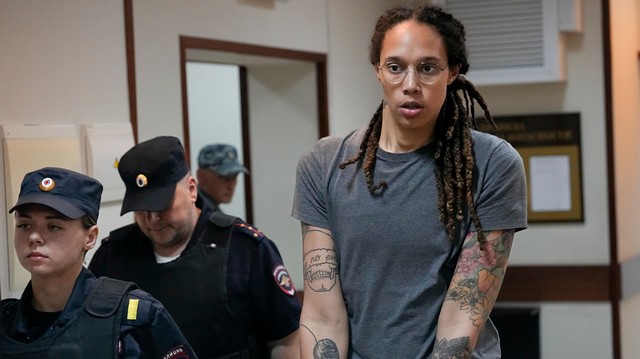As outrage mounts over WNBA star Brittney Griner’s prison sentence in Russia, harsh U.S. weed laws are also coming under scrutiny.
Aug 16 2022

Even if Brittney Griner serves her full nine-year prison sentence, she’d be free from a Russian penal colony by 2031—but Allen Russell would still be sitting in a Mississippi prison for getting caught with less than two ounces of weed.
Russell, who’s also Black, was sentenced to life in prison for possession of 43 grams of cannabis in 2019. In June, the Mississippi Supreme Court upheld his sentence and ruled that it wasn’t “cruel and unusual punishment.”
Lawyers for Griner are appealing the 31-year-old WNBA star’s conviction for drug possession and smuggling after she was caught with less than a gram of cannabis oil in her luggage at Sheremetyevo International Airport, near Moscow. The Russian government has also said it’s willing to discuss a prisoner swap.
But as outrage mounts over Griner’s imprisonment, many lawyers and anti-prohibition advocates point out that the U.S. regularly doles out harsh sentences to people, especially Black Americans, for weed crimes.
Despite a wave of U.S. states legalizing weed in recent years, it’s still a Schedule I substance (the same category as heroin) at the federal level, meaning the government believes it has a high potential for abuse and is not an accepted medical treatment. Hundreds of thousands of people are arrested for weed every year, and the American Civil Liberties Union found that Black people are nearly four times more likely to get arrested for possession than white people are, despite the two groups having similar rates of use.
“We have thousands of people who are sitting in jail, in prison today because of marijuana offenses, including low-level marijuana offenses. So it makes it really hard for us to stand on any legal ground or even moral high ground,” said Maritza Perez, director of federal affairs for the Drug Policy Alliance.
Some of the harshest sentences happen in states with so-called “three strikes” or habitual offender laws, which punish people with prior convictions more severely. In some cases, if a person commits three felonies, a judge must impose the harshest sentence upon the third conviction.
In Russell’s case, he was sentenced to life in prison without parole because of his prior burglary convictions. Burglary is considered a violent offense in Mississippi regardless of whether there’s proof that violence occurred.
He’s not alone. Mississippi mother Tameka Drummer is also serving a life sentence for less than two ounces of weed under the state’s habitual offender laws. Trent Bouhdida was 21 when he was caught selling an undercover cop an ounce of weed in 2015; because of his prior convictions, Bouhdida, a Black man, was sentenced to 16 years in jail, as reported by the Phoenix New Times.
President Joe Biden has said Russia is “wrongfully detaining Brittney.”
“It’s unacceptable, and I call on Russia to release her immediately,” Biden said in a statement. He made no mention of Russia’s drug laws or jailing people for cannabis.
Leave a comment